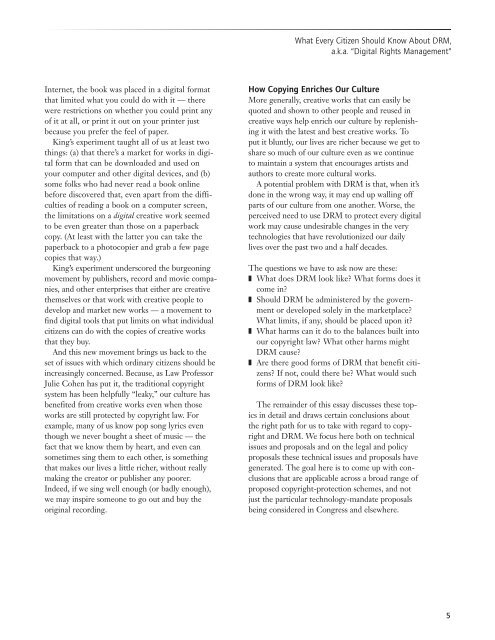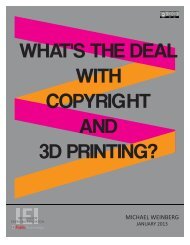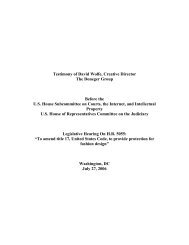What Every Citizen Should Know About DRM, aka - Public Knowledge
What Every Citizen Should Know About DRM, aka - Public Knowledge
What Every Citizen Should Know About DRM, aka - Public Knowledge
Create successful ePaper yourself
Turn your PDF publications into a flip-book with our unique Google optimized e-Paper software.
<strong>What</strong> <strong>Every</strong> <strong>Citizen</strong> <strong>Should</strong> <strong>Know</strong> <strong>About</strong> <strong>DRM</strong>,a.k.a. “Digital Rights Management”Internet, the book was placed in a digital formatthat limited what you could do with it — therewere restrictions on whether you could print anyof it at all, or print it out on your printer justbecause you prefer the feel of paper.King’s experiment taught all of us at least twothings: (a) that there’s a market for works in digitalform that can be downloaded and used onyour computer and other digital devices, and (b)some folks who had never read a book onlinebefore discovered that, even apart from the difficultiesof reading a book on a computer screen,the limitations on a digital creative work seemedto be even greater than those on a paperbackcopy. (At least with the latter you can take thepaperback to a photocopier and grab a few pagecopies that way.)King’s experiment underscored the burgeoningmovement by publishers, record and movie companies,and other enterprises that either are creativethemselves or that work with creative people todevelop and market new works — a movement tofind digital tools that put limits on what individualcitizens can do with the copies of creative worksthat they buy.And this new movement brings us back to theset of issues with which ordinary citizens should beincreasingly concerned. Because, as Law ProfessorJulie Cohen has put it, the traditional copyrightsystem has been helpfully “leaky,” our culture hasbenefited from creative works even when thoseworks are still protected by copyright law. Forexample, many of us know pop song lyrics eventhough we never bought a sheet of music — thefact that we know them by heart, and even cansometimes sing them to each other, is somethingthat makes our lives a little richer, without reallymaking the creator or publisher any poorer.Indeed, if we sing well enough (or badly enough),we may inspire someone to go out and buy theoriginal recording.How Copying Enriches Our CultureMore generally, creative works that can easily bequoted and shown to other people and reused increative ways help enrich our culture by replenishingit with the latest and best creative works. Toput it bluntly, our lives are richer because we get toshare so much of our culture even as we continueto maintain a system that encourages artists andauthors to create more cultural works.A potential problem with <strong>DRM</strong> is that, when it’sdone in the wrong way, it may end up walling offparts of our culture from one another. Worse, theperceived need to use <strong>DRM</strong> to protect every digitalwork may cause undesirable changes in the verytechnologies that have revolutionized our dailylives over the past two and a half decades.The questions we have to ask now are these:❚ <strong>What</strong> does <strong>DRM</strong> look like? <strong>What</strong> forms does itcome in?❚ <strong>Should</strong> <strong>DRM</strong> be administered by the governmentor developed solely in the marketplace?<strong>What</strong> limits, if any, should be placed upon it?❚ <strong>What</strong> harms can it do to the balances built intoour copyright law? <strong>What</strong> other harms might<strong>DRM</strong> cause?❚ Are there good forms of <strong>DRM</strong> that benefit citizens?If not, could there be? <strong>What</strong> would suchforms of <strong>DRM</strong> look like?The remainder of this essay discusses these topicsin detail and draws certain conclusions aboutthe right path for us to take with regard to copyrightand <strong>DRM</strong>. We focus here both on technicalissues and proposals and on the legal and policyproposals these technical issues and proposals havegenerated. The goal here is to come up with conclusionsthat are applicable across a broad range ofproposed copyright-protection schemes, and notjust the particular technology-mandate proposalsbeing considered in Congress and elsewhere.5





